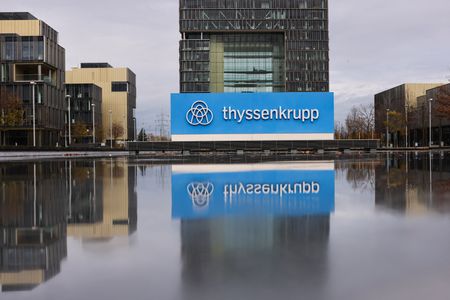 1
1 1
1
By Christoph Steitz and Tom Käckenhoff
FRANKFURT (Reuters) – Thyssenkrupp’s outgoing Chief Executive Martina Merz sought to assuage investor fears that her exit would slow down the conglomerate’s turnaround efforts, as the German company swung to a net loss in the second-quarter.
The submarines-to-car parts group has been criticised for not making enough progress with plans to hive off its steel, defence and hydrogen divisions, which are critical to turning the industrial firm into more of a holding company.
Slow progress essentially cost Merz her job, sources have told Reuters and investors have expressed concern her departure may further hinder restructuring efforts.
She will leave at the end of the month after less than four years in the job and is expected to be replaced by Norma interim CEO Miguel Angel Lopez Borrego in June.
Merz, during her final quarterly results presentation, said she saw no indication that the change in leadership would delay strategy execution, even saying she had “no doubt that the speed may even increase”.
The comments came after Thyssenkrupp increased its outlook for free cash flow before mergers and acquisitions — a key gauge of the German conglomerate’s financial health — now expecting it to turn positive for the first time in seven years.
Thyssenkrupp still posted a second-quarter net loss of 223 million euros ($245 million) from a year-ago profit of 565 million euros, after a rise in interest rates and cost of capital led to 350 million euros in impairment losses at the Steel Europe division.
Shares in the company were down 3.3%.
Steel Europe suffered an adjusted operating loss of 14 million euros in the quarter, down from a 479 million profit in the same period last year, Thyssenkrupp said.
Adjusted EBIT declined by 74% to 205 million euros in the second quarter, beating the 154 million consensus in a Vara poll provided by the company. Analysts at JP Morgan, however, said the second quarter “reads weak where it counts”, citing the quarterly loss at the steel division.
In a joint letter to shareholders, Merz and finance chief Klaus Keysberg said options for the steel business included “possible cross-sector and cross-border partnerships” and that talks with potential partners were underway.
($1 = 0.9084 euros)
(Reporting by Christoph Steitz and Tom Kaeckenhoff; Editing by Alexander Smith, Miranda Murray, David Goodman and Sharon Singleton)